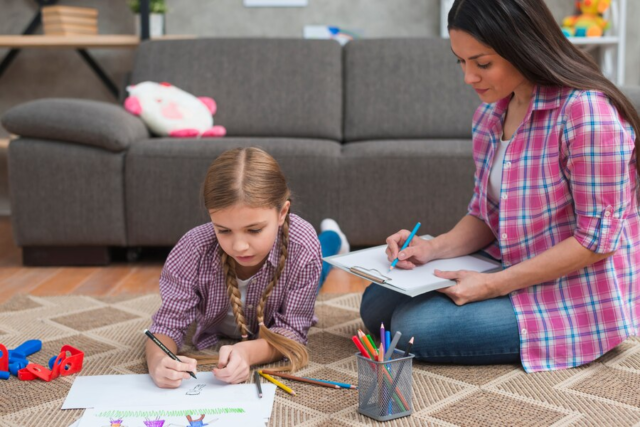Childhood is a time of rapid growth and discovery, but it can also be fraught with challenges that leave both children and parents searching for answers. Whether it’s dealing with anxiety, behavioral issues, or the aftermath of trauma, many families find solace and support in the realm of child therapy. Understanding how therapy can effectively guide children through these challenges is crucial for any parent navigating these uncharted waters.
Recognizing the Need for Therapy
The decision to seek therapy for your child can be daunting, yet it’s often a pivotal step towards providing them with the tools and support they need to thrive. There are various signs that may indicate therapy could be beneficial, such as persistent sadness or withdrawal, sudden changes in behavior, difficulty coping with stress or transitions, or challenges in social interactions. Trusting your instincts as a parent and seeking professional guidance can make a significant difference in your child’s well-being.
Persistent Emotional Distress:
If your child frequently seems sad, anxious, or withdrawn, especially if these feelings persist over a period of weeks or months, it may indicate underlying emotional struggles that could benefit from therapeutic intervention.
Behavioral Changes:
Sudden and significant changes in behavior, such as increased aggression, defiance, or acting out, can sometimes be a sign that your child is struggling to cope with their emotions or experiences. These behaviors may manifest at home, school, or in social settings.
Difficulty Coping:
Children may face challenges in coping with stressors such as family transitions (like divorce or relocation), academic pressures, bullying, or loss of a loved one. If your child seems overwhelmed or unable to cope effectively with these stressors, therapy can provide them with tools to manage their emotions and navigate difficult situations.
Social or Academic Issues:
Persistent difficulties in forming friendships, interacting with peers, or performing academically despite adequate support and resources may indicate underlying emotional or developmental challenges that therapy can address.

Traumatic Events:
If your child has experienced a traumatic event, such as abuse, neglect, a serious accident, or the loss of a loved one, therapy can help them process their emotions, heal from the trauma, and develop resilience.
Physical Symptoms:
Sometimes emotional distress can manifest in physical symptoms such as frequent headaches or stomach aches without a clear medical cause. If medical evaluations have ruled out physical health issues, exploring therapy may uncover underlying emotional causes.
The Role of the Therapist
Child therapists are trained professionals who specialize in understanding the unique emotional and developmental needs of young individuals. They create a safe and supportive environment where children can express themselves freely through play, talk therapy, or other therapeutic modalities tailored to their age and circumstances. These sessions are designed not only to address immediate concerns but also to equip children with coping strategies and emotional resilience that will serve them well into adulthood.
Types of Therapeutic Approaches
Therapy for children often involves approaches such as play therapy, cognitive-behavioral therapy (CBT), art therapy, and family therapy, among others. Play therapy, for instance, allows children to communicate their thoughts and feelings through play activities, which can be particularly effective for younger children who may not have the verbal skills to express themselves fully. CBT, on the other hand, focuses on identifying and changing negative thought patterns and behaviors, teaching children how to manage their emotions and solve problems constructively.
Collaboration with Parents
Effective therapy for children is not just about the sessions with the therapist but also involves collaboration with parents or caregivers. Therapists often provide guidance and strategies that parents can implement at home to reinforce the therapeutic process. This collaboration strengthens the support system around the child and enhances the consistency of care across different environments.
The Benefits of Therapy
The benefits of therapy extend beyond addressing immediate concerns. It helps children develop self-awareness, resilience, and healthier coping mechanisms. By learning to express and regulate their emotions effectively, children can improve their relationships with peers and family members, perform better academically, and navigate life’s challenges more confidently.
Conclusion
Navigating childhood challenges through therapy is a journey that requires patience, understanding, and a commitment to your child’s well-being. As a parent, you play a vital role in supporting your child through this process, from recognizing the signs that therapy may be needed to actively participating in their therapeutic journey. By seeking out effective therapy and working collaboratively with skilled professionals at Meditative Minds Counseling & Wellness, you can empower your child to overcome obstacles and thrive in their development.
Remember, every child is unique, and therapy is tailored to meet their individual needs and circumstances. Embracing therapy as a tool for growth and healing can make a profound difference in your child’s life, setting the stage for a brighter and more resilient future. Visit us at 2806 Cochran St, Simi Valley, CA 93065, or contact us today to learn more about how we can support your child’s journey through therapy.


